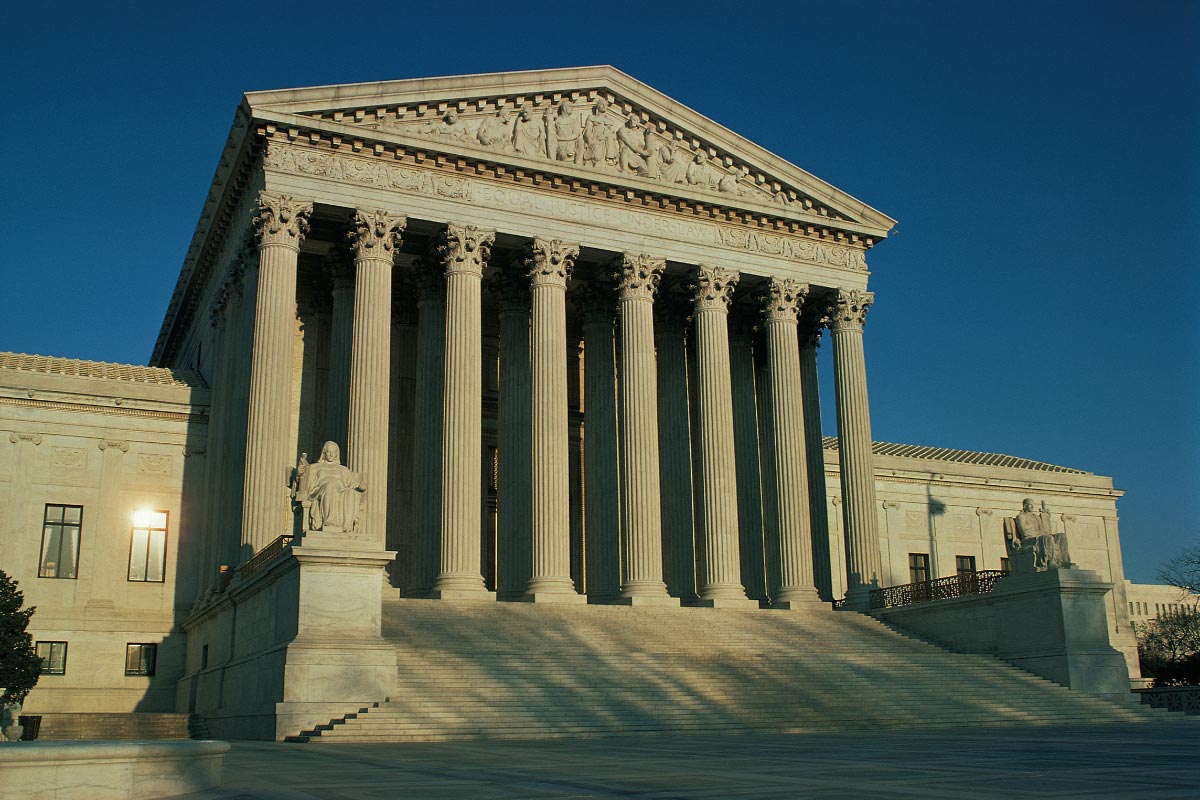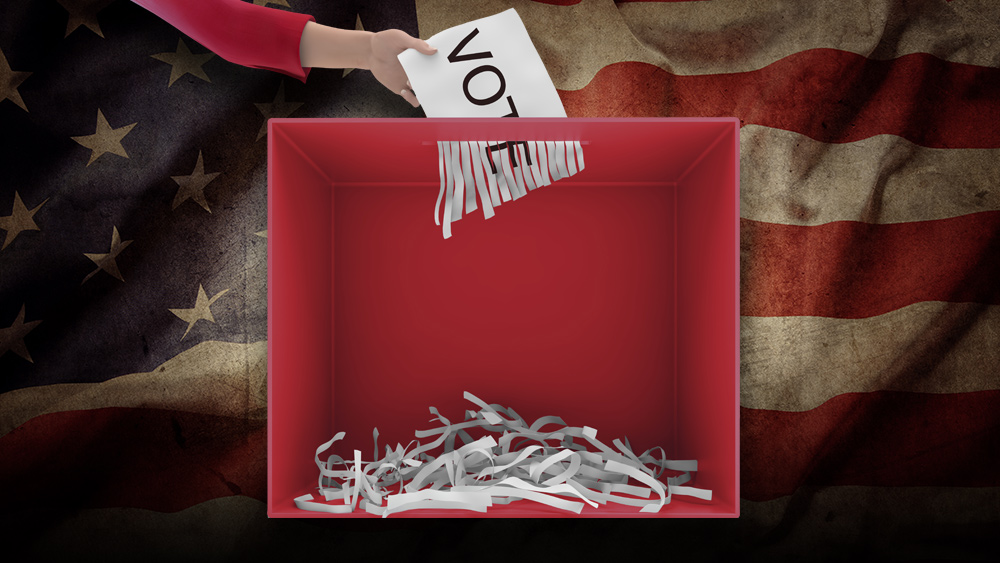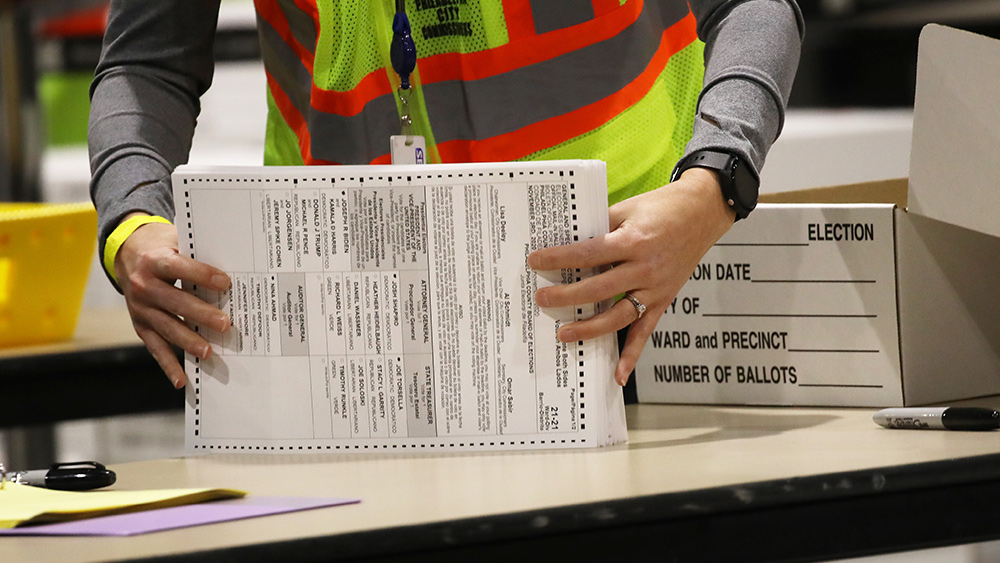We were laughed out of court because the courts have become ridiculous
01/10/2021 / By News Editors

Conservatives who object to election fraud have found that liberals’ favorite retort is “your claims have been laughed out of court.”
(Article by Bobby Lopez republished from NOQReport.com)
This argument is authoritarian in its reasoning. It defers to a juridical priesthood and allows one guild, the attorneys, to override what average people can see in front of them. Such an argument should not stagger wise conservatives. The latter can always draw from Plato’s Republic and the debate between Socrates and Thrasymachus over whether justice is merely defined as whatever the mightiest people in society say it is.
Spoiler! Socrates wins that debate. That’s partly why people live in free republics in many parts of the world 2,400 years later.
Juridical systems have a long and checkered history. In researching a current book project, Traumatizing the Tongue, I spent years researching the Spanish Inquisition, the French Reign of Terror, the German Gestapo, and the Soviet gulags. In each of these historical examples, political and social upheaval led to illogical judicial systems whose irrational decrees distorted language itself, past the point where Spanish, French, or German could fully recover.
People who have been granted juridical authority can indeed err en masse by an enormous margin, for long periods of time, on matters that should be obvious. No human language has ever appeared that can withstand the basic warning of Jeremiah 17:9 (inside the heart is wickedness beyond measure).
The English-speaking world held on to sensible systems of judgment for longer than other language communities, partly because English-speaking countries defeated the other language communities. The British led the way in defeating the Spanish Armada and Napoleon, while the English-speaking United States led the way in defeating the Nazis and pushing the Soviets past their breaking point. In researching Traumatizing the Tongue, however, I could not avoid the conclusion that English has passed its expiration point as a rational universal tongue. It was bad enough that the United States courts rejected civil rights cases from the mid-nineteenth to the mid-twentieth century out of hand. By the twenty-first century, American courts were on course to affirm some of the most preposterous claims about sex and gender ever asserted in all human history.
The erosion of commonsense language that arguably began with Roe v. Wade moved quickly in forty-two years to the insanity of Obergefell v. Hodges and even to the madness of the supposedly conservative-dominated Supreme Court in 2020’s Bostock and Henderson v. Box.
In the 1973 decision for Roe v. Wade, Justice Harry Blackmun wrote for the majority in stating that the word “person” in the Fourteenth Amendment (equal protection) could not apply to someone unborn because:
[“Person”] is used in other places in the Constitution. But in nearly all those instances, the use of the word is such that has application postnatally. None indicates, with any assurance, that it has any possible prenatal application.[1]
This exemplifies the mangled follies of language that only a high-ranking judicial authority could find persuasive. Are very old people going to be seen as non-people because the Constitution does not mention people with advanced signs of aging? Are blind or illiterate people going to be similarly classed because the Constitution is not written in Braille and does not include instructions to read it aloud to people who can’t read?
Anybody with a brain untainted by decades of work in the Judiciary can understand that all people begin as fetuses, and all fetuses, barring a miscarriage, medical abnormality, or violent intervention, will eventually go from being prenatal to postnatal.
Obviously, the purpose behind extending equal life protection to all persons came from the moral sense that human beings are more valuable to human beings than are cows, pigs, or chickens. For years the simple understanding was, if you don’t want to deal with raising a baby, hold off on having sex and support the law and order that keeps rapists at bay. Otherwise, once you conceive life you should treat that life the way you would want your own life to be treated.
Language distortion spreads like mold. After a certain point, you can’t recover common sense anywhere, and all is lost. The inability to see the word “person” as the word clearly presents itself led, in America’s case, to the total inability to understand the words “man,” “woman,” “mother,” “father,” “child,” and “marriage.”
By 2015, the deterioration of language was far-reaching. I participated in the legal efforts to resist the redefinition of family because I knew that every child has a mother and father, somewhere, even if one or both are in the grave. The only possession with which a child is naturally born, in fact, is his relationship to the man and woman from whose flesh he was conceived. Court after court brushed aside this commonsense reality and instead lost its train of thought in bizarre word definitions.
These distortions suited a well funded political lobby that wanted to satisfy its client base, same-sex couples, with the means to purchase a child’s love and obedience. The courts, rather than acting to protect the child’s heritage, acted to strip the child of the sacred right to a relationship with his biological origins. In the Hollingsworth decision prior to Obergefell, Justice Kennedy even stated that the redefinition of marriage would be necessary to force children adopted by same-sex couples to view their putative parents as the legitimate claimants to their submission and affection. In other words, the law would be necessary to make kids love them no matter how hurt they felt by the loss of a mother or father.
Through sophistry, the equal protection clause of the Fourteenth Amendment meant that same-sex couples had equal rights to children but that the children obtained in fulfillment of this right did not have equal rights to a mother and father.
Deal with the main point, stop beating around the bush
Much of what has happened with the courts’ rejection of the open-and-shut electoral fraud case can be blamed on the overall decline in reason and common sense in the Judiciary. Yet I cannot totally blame the courts without taking a critical look at the choices by conservative lawyers. I saw many mistakes in the conservative argument for marriage repeated in the recent struggle over the election.
The public supported a basic truth: the sexual relationship between a man and a woman is unlike any other relationship, especially because this one uniquely produces new human life; hence, society needs to recognize the sacred nature of such a bond rather than muddle it with analogies to same-sex relationships, which are in many ways hard to differentiate from friendships. Many people who were formerly in the gay lifestyle and then came out could attest to the fact that gay relationships, no matter how much we wish to respect them, differ substantially from a heterosexual bond and will never be able to replace male-female unions.
Okay, that was the basic point. Yet that wasn’t the point that I found lawyers making. Scores of conservative lawyers came up with convoluted arguments to present before the courts. They talked about states’ rights and suddenly made the entire issue about the “religious liberty” of Christian third parties who were not gay, did not have gay children, did not have gay parents, and might merely be asked to bake a cake or take photographs for gay so-called weddings.
Many of us got involved because we wanted to protect people from harm, regardless of whether we were Christian or not. I personally did not find the wedding cake arguments urgent. The religious liberty argument struck many as weak and offensive, since Christians as a class were not harmed as immediately as the people who dealt with the fallout of homosexuality in their personal or family relationships.
The strongest and most resonant argument for marriage was the crudest one I saw in comments all across the internet: the anus is not a sexual organ, and two people of the same sex can’t create a baby unless they buy one or steal one from other people. The next strongest argument is equally basic: Have you seen the photos from gay pride parades? Is that a good environment for raising kids? These points are harsh, but people understand them immediately, and liberals do not have effective counterpoints against them because they’re so obvious.
I remember being on countless conference calls where powerful lawyers told us we couldn’t discuss same-sex abuse, adoption abuses, rates of disease or mental illness, or any of a number of arguments that represented the concerns that led many of us to be on their side. We were not supposed to make any references to anal or oral sexual behavior, or to penises or vaginas. I could never figure out why some people’s amicus briefs came to the attention of the justices and others, which seemed far more compelling, were passed over. Nor could I figure out why some lawyers whose arguments didn’t make any sense had the power to choose the arguments presented before the judges.
Some of this history repeated itself in 2020 with the election fraud cases. Rudy Giuliani and Jenna Ellis command our respect as legal experts. But I could not shake the feeling that there was a similar drift from the main point of the election controversy. Many of the cases brought to courts were referring to infractions against election law, such as deadlines for receipt of mail or the definition of indefinite confinement. But they seemed to beat around the bush. When the mail arrived is not the point; the point is that the mail-in ballots that got counted included a bunch of fakes.
Somebody got into the computers or tampered physically with the ballots, throwing out real ballots and/or stuffing the counts with fake ones, in order to generate tabulations that did not reflect reality. In a series of livestreams with Maricopa County election attorney Rachel Alexander, we brainstormed a hypothesis of how the election was stolen step by step, by piecing together the most pertinent pieces of evidence.
The one thing our side could have done better in the court cases would be to paint the stark picture of unscrupulous, scheming people carting real ballots to a trash dump while other scoundrels printed off millions of fake ballots and swapped them in while the Republican observers were blocked from watching them. The Venezuelan origins of Dominion, laws about due dates for sending ballots in, and the definition of “confined” are legally interesting but also less infuriating than the main point, which is that somewhere in America, there exist a rotten group of people who were low-down and dirty enough to throw away people’s votes and print out false ones.
We don’t want to be unfair to the lawyers who bravely stood up for Trump. The courts knew that this was what really mattered, and we can’t blame Trump’s lawyers for the fact that they jumped on arcane technicalities about timing and standing to throw the cases out. But I still worry that our side focused too much on Article II of the Constitution, the right of state legislatures, and other legal specificities that allowed the courts to go on detours and avoid the main issue.
One good thing is that this time, five years later, I don’t feel quite as powerless. More conservatives are paying attention than was true in 2015. I don’t think liberals can isolate us or deny how many of us there are who know the truth. That’s one good thing to say about this round.
Read more at: NOQReport.com
Submit a correction >>
Tagged Under:
cheaters, Collapse, conservatives, courts, deception, election fraud, elections, justice, lawyers, left cult, liberals, politics, President Trump, Republicans, rigged, Supreme Court, vote fraud
This article may contain statements that reflect the opinion of the author
RECENT NEWS & ARTICLES
Trump.News is a fact-based public education website published by Trump News Features, LLC.
All content copyright © 2018 by Trump News Features, LLC.
Contact Us with Tips or Corrections
All trademarks, registered trademarks and servicemarks mentioned on this site are the property of their respective owners.





















